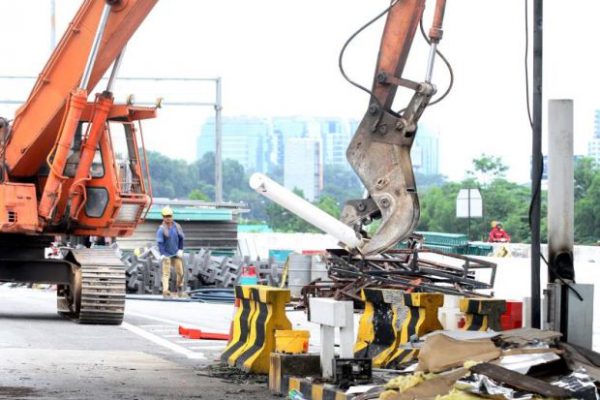Demolition work begins at Batu Tiga toll plaza
Demolition works are currently underway at the Batu Tiga toll plaza that ended operations earlier this year, and is part of the original schedule. The Malaysian Highway Authority (MHA) planned to begin the demolition works after Chinese New Year. The work is expected to be completed by the end of March. It dismissed rumours alleging that the demolition was sped up following the second accident that claimed another two lives on Monday night. Plus highway managing director Datuk Azman Ismail said the work will done in stages and had already begun in January, with the relocation of toll equipment, signage as well as other assets. (The Star Online)
Final version of TPP deal released, includes Malaysia
The final version of the Trans-Pacific Partnership (TPP) trade deal aimed at cutting trade barriers in some of Asia-Pacific’s fastest-growing economies was released on Wednesday, signalling the pact was a step closer to reality even without its star member the United States. More than 20 provisions have been suspended or changed in the final text ahead of the deal’s official signing in March. Following the USA’s withdrawal early last year, the 11 remaining nations, led by Japan, finalized a revised trade pact in January, called the Comprehensive and Progressive Agreement for Trans-Pacific Partnership (CPTPP). It is expected to be signed in Chile on March 8. (The Star Online)
Singapore property developers fall after higher home purchase tax
Shares of Singapore-listed property developers were among the top losers on the main index, following an increase in stamp duty on expensive home purchases. Singapore will apply a new top marginal rate of 4% stamp duty on the portion of residential property value in excess of S$1 million. High-end and en bloc purchases will face the highest impact, developers may take a hit on margins, said an analyst. However, the impact would be minimal on individual home buyers and is unlikely to hurt the current positive market sentiment. (The Edge Markets)
Al-Salam REIT net profit falls to RM40.61mil
Al-Salam REIT’s net profit fell to RM40.61 million in FY17 from RM46.67 million in FY16. Revenue, however, rose to RM80.03 million from RM76.14 million previously. It attributed the weaker profit to lower fair value gain on investment properties of RM5.1 million versus RM10.6 million in 2016, while the higher revenue emanated from bigger contribution from its retail and office building segments. The company planned to ensure its existing assets were well-maintained to ensure the stability of rental income and REIT income distributions. It is also on the lookout for potential acquisitions, including pipeline assets from Johor Corporation Group. (NST Online)
Bina Darulaman slips into red in Q4
Bina Darulaman Bhd (BDB) swung to the red registering a net loss of RM10.4 million in 4Q2017, due to lower contribution from property road building and quarry divisions. Revenue for the quarter plunged 64.5% to RM54.7 million. The group attributed its weaker financial performance to lesser billings and delayed launches, but said it was optimistic and confident of better prospects for the coming financial year with a strong cash reserve of RM 119.8 million and total assets of RM802 million. (The Sun Daily)
Malaysia was largest sukuk issuer globally in 2017
Malaysia maintained its leadership as the world’s largest sukuk issuer in 2017, accounting for US$36.5 billion (RM142.7 billion) of global sukuk issuance. It was followed by Saudi Arabia (US$31.7 billion), Indonesia (US$6.9 billion) and Qatar (US$5.6 billion). In 2016, Malaysia also topped the global sukuk arena with US$29.9 billion (RM116.9 billion) of total global issuance. (The Edge Markets)
 Airbnb positive of growth in Malaysia amid registration drive
Airbnb positive of growth in Malaysia amid registration drive
Home sharing platform Airbnb is confident that the service will continue to grow in Malaysia, despite the requirement from DBKL that owners or operators who are renting out their properties for short-term stays need to be registered by year-end. “Malaysia is one of our fastest growing markets in Asia… we believe home sharing is here to stay, and we look forward to continue working closely with the relevant authorities to craft laws, including rules around registration and tourism tax collection,” said Airbnb South-East Asia head of public policy Mich Goh. He also stressed that Airbnbs eventually benefit the local community and should be encouraged. (The Malaysian Reserve)





